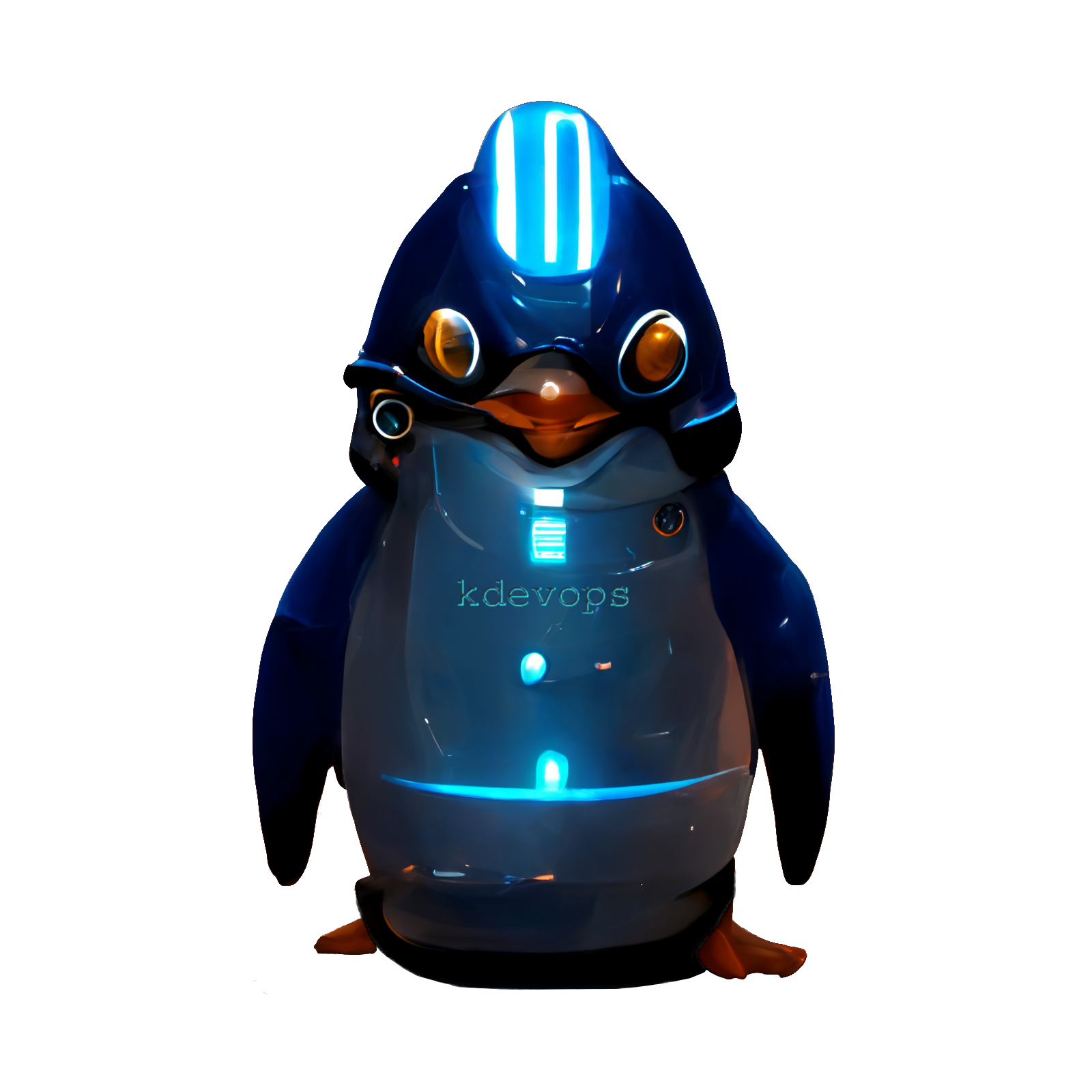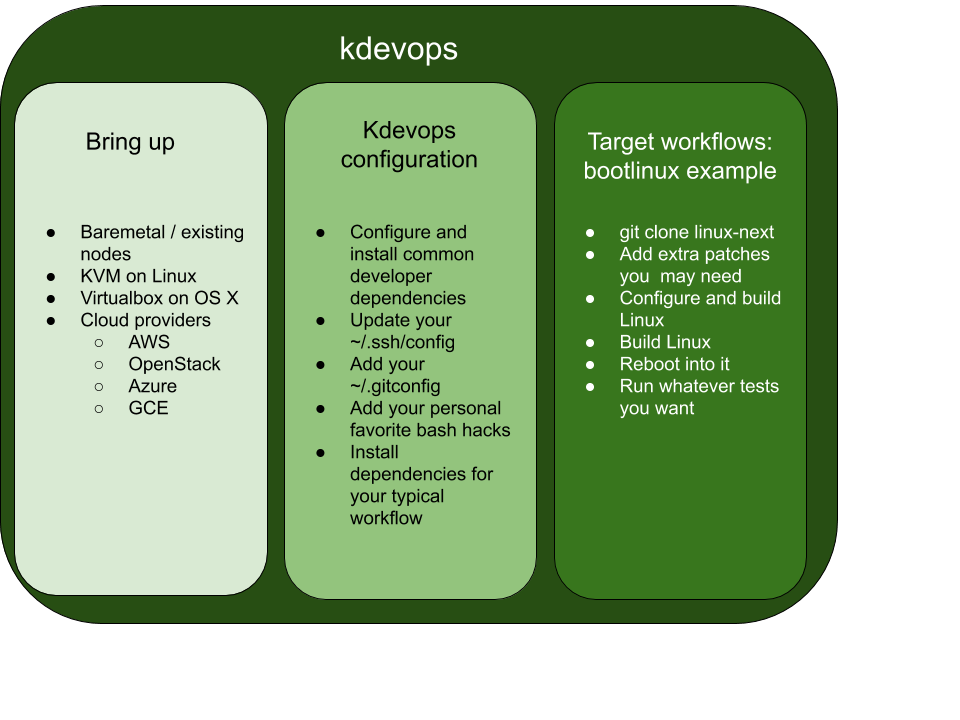The master git repo for kdevops is:
kdevops provides a framework for automation for optimal Linux kernel development and testing. It is intended to help you both be able to ramp up with any complex Linux kernel development environment super fast, and to also let you ramp up an entire lab for Linux kernel testing for a complex subsystem in a jiffy.
It makes use of local ansible roles and optionally lets you use vagrant for different virtualization technologies or terraform in order to support any cloud provider, if you're into that sort of stuff. Variability is provided through the same variability language used in the Linux kernel, kconfig. It is written by Linux kernel developers, for Linux kernel developers. The project aims to enable support for all Linux distributions, and even has some support for OS X.
To give you an idea of the power and goals behind kdevops we provide a few quick demos of what you can do below. More workflows will be added with time. Additional documentation detailing how to get started as well as how to add new workflows follows the quick demos.
Configure kdevops to use bare metal, cloud or a local vm based solution, pick your distribution of choice, enable the Linux kernel workflow, select target git tree, and get up and running on a freshly compiled Linux git tree in just 4 commands:
- optional :
./scripts/check_ansible.sh make menuconfigmakemake bringupmake linuxmake linux HOSTS="kdevops-xfs-crc kdevops-xfs-reflink"for example if you wanted to restrict running the above command only to the two hosts listed
To test a kernel against fstests, for example, if you enable the fstests workflow you can just run:
make fstestsmake fstests-baseline
Be sure to use CONFIG_KDEVOPS_WORKFLOW_DEDICATE_FSTESTS=y unless you know what you are doing.
To test a kernel against fstests, for example, if you enable the blktests workflow you can just run:
make blktestsmake blktests-baseline
Be sure to use CONFIG_KDEVOPS_WORKFLOW_DEDICATE_BLKTESTS=y unless you know what you are doing.
To test the kernel's nfs server with the pynfs testsuite, enable the pynfs workflow and then run:
make pynfsmake pynfs-baseline
The Linux kernel has a set of sets under tools/testing/selftests which we call "Kernel selftests". Read the Linux kernel selftests documentation. Running selftests used to be fast back in the day when we only had a few kernel selftests. But these days there are many kernel selftests. Part of the beauty of Linux kernel selftests is that there are no rules -- you make your rules. The only rules are at least expicitly mentioning a few targets for Makefiles so that the overall selftests facility knows what target to call to run some tests. Part of the complexity in selftests these days is that due to the lack of rules, you may end up needing a bit of dependencies installed on the target node you want to run the tests on. Kdevops will take care of that for you, and so selftests support are added by each developer which wants to help make this easier for users. Today there is support for at least 3 selftests:
make selftestsmake selftests-baseline
You can also run specific tests:
make selftests-firmwaremake selftests-kmodmake selftests-sysctl
Using CXL today means you have to build QEUM. kdevops supports building QEMU for you, and it will be done for you if you want to enable a CXL development environment. To ramp up with CXL (other than bringup and the above linux target) just run:
make cxlmake cxl-test-probemake cxl-test-meson
We have a public chat server up, for now we use discord:
It is best to think about kdevops in phases of your desired target workflow. The first thing you need to do is get systems up. You either are going to use baremetal hosts, use a cloud solution, or spawn local virtualized guests.
The phases of use of kdevops can be split into:
- Bring up
- Make systems easily accessible, and install generic developer preferences
- Run defined workflows
Below is kdevops' recommended documentation reading.
- kdevops requirements
- kdevops' evolving make help
- kdevops configuration
- kdevops mirror support
- kdevops first run
- kdevops running make
- kdevops libvirt storage pool considerations
- kdevops PCIe passthrough support
- kdevops running make bringup
- kdevops example workflow: running make linux
- kdevops running make destroy
- kdevops make mrproper
- kdevops Large Block Size R&D
kdevops supports its own kernel continous integration support, so to allow
Linux developers and Linux distributions to keep track of issues present in
any of supported kdevops workflows and be able to tell when new regressions
are detected. Note though that kernel-ci for kdevops is only implemented on
a few workflows, such as fstestse and blktests. In order to support a kernel-ci
part of the hard task is to come up with what a baseline is, and in kdevops
style, be able go easily git diff and read a regression with one line
per regression. This requires a bit of time and work. And it is why some
other workflows do not yet support a kernel-ci.
Documentation for this follows:
kdevops was put under the linux-kdevops organization to enable other developers to commit / push updates without any bottlenecks.
kdevops has started to enable users / developers to also push results for tests. This goes beyond just collecting baseline rusults for known failures, this aims to collect within all dmesg / bad log files for each test that failed.
An arbitrary namespace is provided so to enable developers, part of the linux-kdevops organization to contribute findings.
- 2023 - day to day kernel development kdevops demo to fix a bug which covers the topics:
- Setting up kdevops to use mirroring for Linux git trees
- Using git remotes on your host kdevops linux directory
- An example of a real world kernel issue being investigated and fixed upstream
- Recommendations and value for reproducers for bugs, in this case stress-ng was used, more details on the commit that fixes the issue
- Using a specific remote branch for development, in this example 20230328-module-alloc-opts was used as an example PATCH v1 series
- Using
localversion.*files to help identify kernel names on Grub prompt - Using
make modules_install install -j100on your guest using 9p - Console access with virsh console to guest
- Console access to pick your kernel at bootup
- Example of a small change to a real future v2 patch series
- 2023 - Live kdevops demo which covers the topics:
- An example with AWS with NVMe drives which support 16k atomic writes on ARM64
- Demonstrates how to ramp up with a custom arbitrary new Linux kernel branch for testing based on linux-next
- Demonstrates how to start testing btrfs with linux-next
- Demonstrates how to test with XFS for linux-next
- Demonstrates initial work on NFS testing with pynfs
- Demonstrates current CXL workflows / testing
- Demonstrates how a few stable XFS maintainers are using kdevops to test XFS using local virtualization solutions or cloud solutions
- Demonstrates dynamic Kconfig generation in order to support PCIe-passthrough
- 2022 - LSFMM - Challenges with running fstests and blktests
- 2020 - SUSE Labs Conference - kdevops: bringing devops to kernel development
Below are sections which get into technical details of how kdevops works.
- Why Vagrant is used for virtualization
- A case for truncated files with loopback block devices
- Seeing more issues with loopback / truncated files setup
- Adding a new workflow to kdevops
- Kconfig integration
- Motivation behind kdevops
- Linux distribution support
- Overriding all Ansible role options with one file
- kdevops Vagrant support
- kdevops terraform suppor - cloud setup with kdevops
- kdevops local Ansible roles
- Tutorial on building your own custom Vagrant boxes
This work is licensed under the copyleft-next-0.3.1, refer to the LICENSE file for details. Please stick to SPDX annotations for file license annotations. If a file has no SPDX annotation the copyleft-next-0.3.1 applies. We keep SPDX annotations with permissive licenses to ensure upstream projects we embraced under permissive licenses can benefit from our changes to their respective files. Likewise GPLv2 files are allowed as copyleft-next-0.3.1 is GPLv2 compatible.

